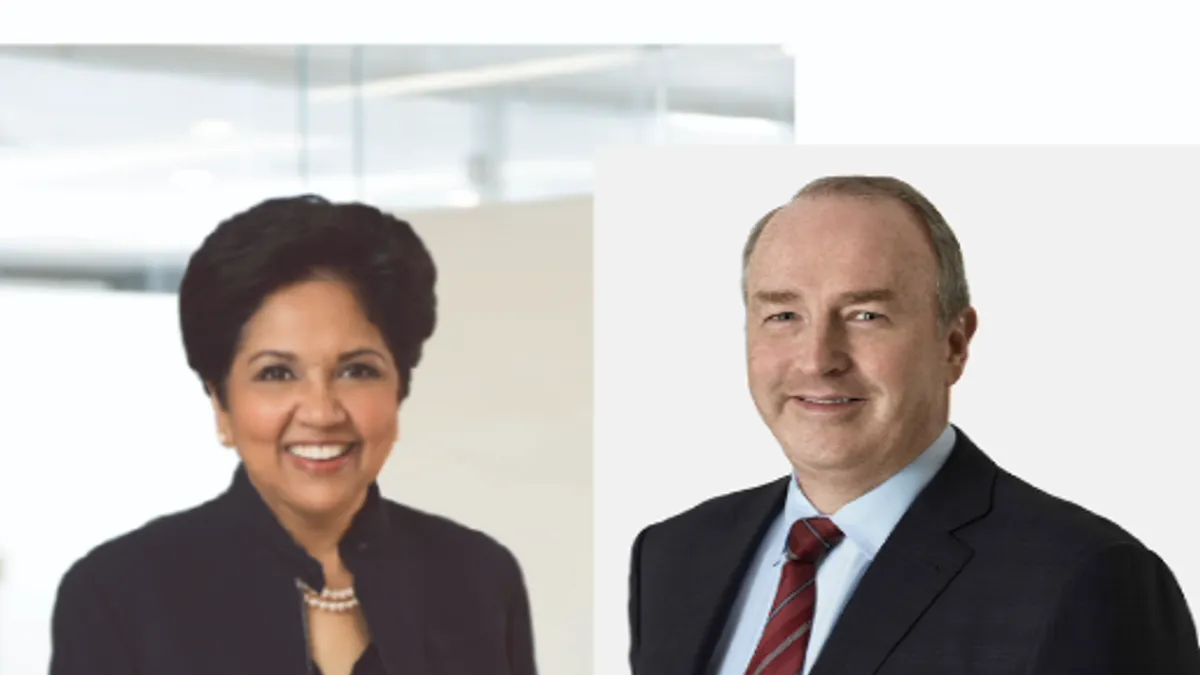Indra Nooyi's promotion from CFO to CEO of PepsiCo in 2006 broke barriers, as a woman and an Indian-American.
Nooyi went on to lead the company on a steep growth path through acquisitions and strategic divestments and broke another barrier by becoming an early champion of the socially and environmentally responsible corporation.
The same forward-looking values that led to Nooyi’s rise from CFO to CEO and then board chair, from which she retired earlier this year, have defined the company’s finance operation for decades, and for that reason, PepsiCo is CFO Dive’s Company of the Year.
"I think there’s probably no one company where I’ve heard CFOs give greater credit than to PepsiCo," said Jack Sweeney, host of the CFO Thought Leader podcast. "What exactly was Pepsi getting right? What was setting it apart?"
Andreas Schulmeyer, CFO of Better Choice, a pet wellness company, and a former CFO of PepsiCo’s China operation, has an answer: the company was a champion of the strategic CFO long before the movement took off in the last decade.
"PepsiCo put an emphasis on the finance part of the planning and the business partnership vs. the controller," he said on Sweeney's podcast. "I don’t come out of a typical accounting school. I actually had one accounting course in my life, so most of my knowledge has come from the experience of being out there. So, the financial planning and the strategic piece are really what drives the PepsiCo finance team. Almost all of the CFOs — divisional, country, and so forth — come from the planning or strategy and business development side rather than the accounting teams. So, I think that’s a resource that’s become more and more in demand rather than the formal accounting treatment."
Whether CFOs do best if they start as a certified public accountant or as a business strategist with an MBA is a debate that will continue, but one thing is clear: PepsiCo recognized early that the rising complexity of business made it necessary for CFOs to approach their job as a strategist.
Fast growth
The Pepsi-Cola Company was launched in 1902 by Caleb Bradham, a pharmacist and businessman in Duplin County, North Carolina. It became PepsiCo in 1965 when it merged with Frito Lay, Inc., and today, it’s one of the largest companies in the world, with a footprint in 200 countries, a $191 billion valuation, and a growth rate of almost 4% a year.
"What we see is a consumer that really likes our products, and is buying them at an increasing rate," Hugh Johnston, the company’s CFO, told CNBC.
Leonard Schutzman, a former senior vice president and treasurer of PepsiCo, said companies of Pepsi’s size and history get trapped by confining their people to narrow roles, but that was not the case with PepsiCo. "Most companies have silos that try to put you in a career path that’s based on whatever your functional skill is, and that’s not good," he said. "They stop multidisciplinary, cross-functional thinking, which you need to be a leader."
In Fast Track Up The Corporate Ladder, his 2016 book based in part on his PepsiCo years, Schutzman called the company a great training ground for CFOs. "It was … an environment that encouraged outside-the-box thinking and prudent risk-taking," he said.
Scott Simmons, managing director of Crist|Kolder Associates, an executive search firm that specializes in CFO and CEO placements, said the company has long been considered a go-to training ground for top CFO talent.
"Their model allows for good operational finance training," he told CFO Dive. "They’re decentralized. If you are a division CFO, you have responsibility for that P&L, so because operational finance is number one on the list of our clients’ requests, and since Pepsi gives its finance executives a chance to understand the business and the operating environment, it’s just a great place to round out those skills."
Brian Newman is the most recent PepsiCo executive to take over the finance function at a major company. He became CFO of UPS, the largest for-hire carrier in North America, in September, after overseeing PepsiCo’s finance and operational functions for Latin America.
"Brian’s deep finance knowledge and broad cross-functional experience will be a great asset as we continue our transformation," UPS Chairman and CEO David Abney said when the hire was announced.
Other former PepsiCo finance chiefs that have taken top jobs outside the company in the last year include Chris Turner, hired as CFO of Yum Brands in August, and Gary Rahlfs, who in October left his position as CFO of University of North Texas to step in as interim CFO of Dean Foods until a permanent replacement is found. While at PepsiCo, Turner held several senior vice president posts and Rahlfs was vice president of finance.
Simmons said PepsiCo executives tend to be good fits for these top CFO jobs because they come with years of experience as a strategic partner for executive leaders.
"If you’re CFO of a division of Pepsi, you’ve partnered with the president of the division, and that means a true partnership," he said. "If there’s a deal to be done, if there’s a market to expand into, you’re part of that discussion, so it’s a good training ground for sharpening strategic skills. It’s not handled by a centralized M&A function that’s doing the big-picture thinking. You’re actually doing that P&L. It’s just a really good platform on which a finance person can grow."
Premium on ethics
PepsiCo alumni also bring the experience of working for what the Ethisphere Institute considers one of the most ethical companies in the world.
The institute launched in 2006, and in 2007 began identifying global corporations that try to incorporate environmental and social sustainability and good governance into their business models. PepsiCo has been recognized on its list of top companies every year since the beginning, and in 2018, in her last year as CEO, Nooyi gave the keynote address for the year’s winners.
"When I was CFO, I talked to all my finance people around the world and kept up the drumbeat: ethics, integrity. It’s an all or nothing thing," she said in her remarks. "There isn’t [something that’s] 95% ethical or 80% ethical. That doesn’t work. Either you’re ethical or you’re not. It’s a binary switch."
In her view, the finance organization of any company must be the foundation on which an organization’s ethical posture is built, because ethics starts with the integrity of the company’s financials.
For the 72 quarters with which she was associated at PepsiCo, which included her years as CFO and CEO, the company met or exceeded its guidance every single time with the exception of two, when it was below guidance by small amounts, she said.
"You need to have solid financial discipline in your arsenal," she said in 2014. "You will fight this label of … bean counters, all kinds of things. I think CFOs or strategy people who became CFOs … say, 'We think it’s a badge of honor rather than a badge of anything else. You’re just jealous you didn’t come from the CFO background.'"














